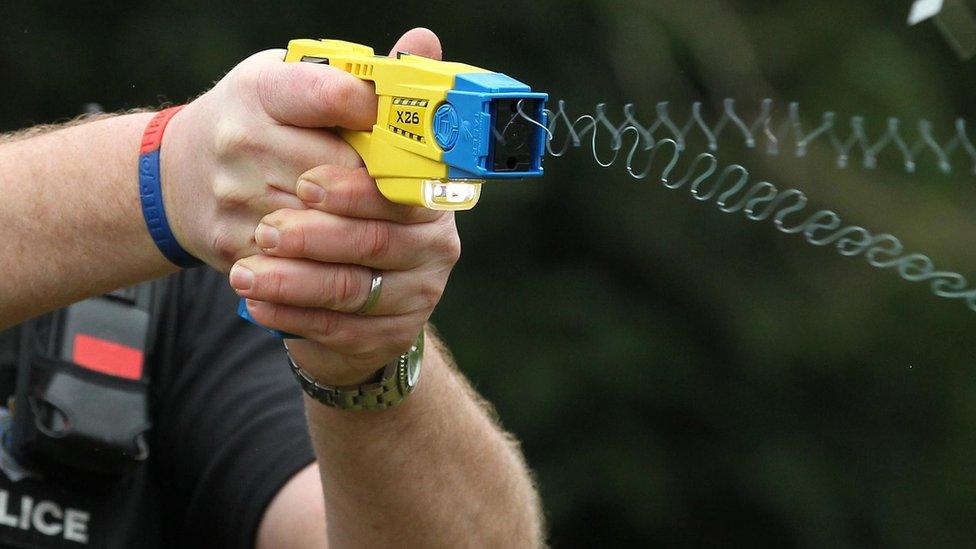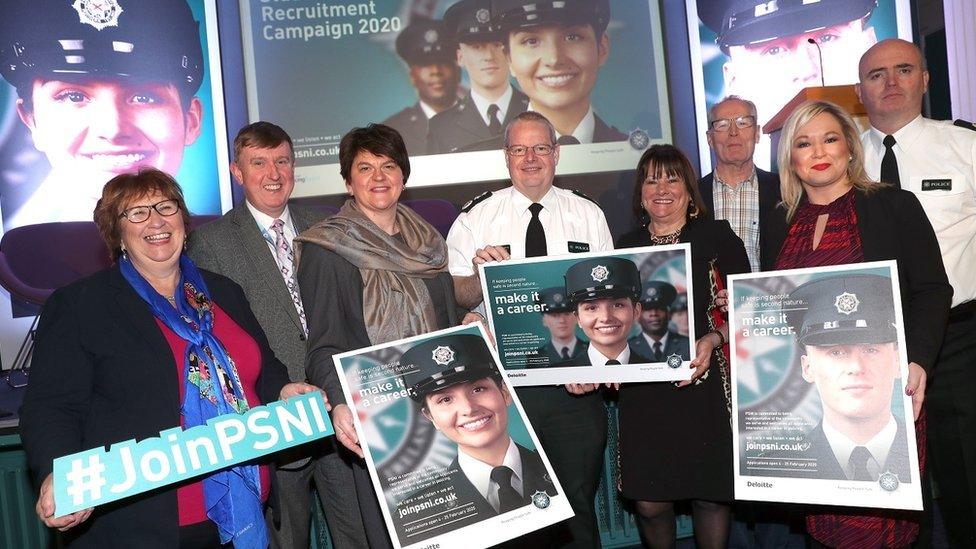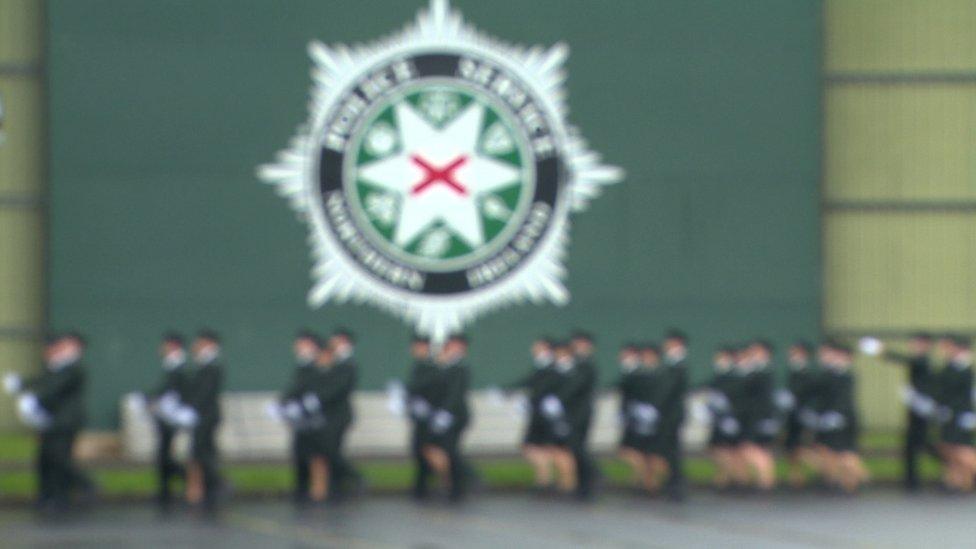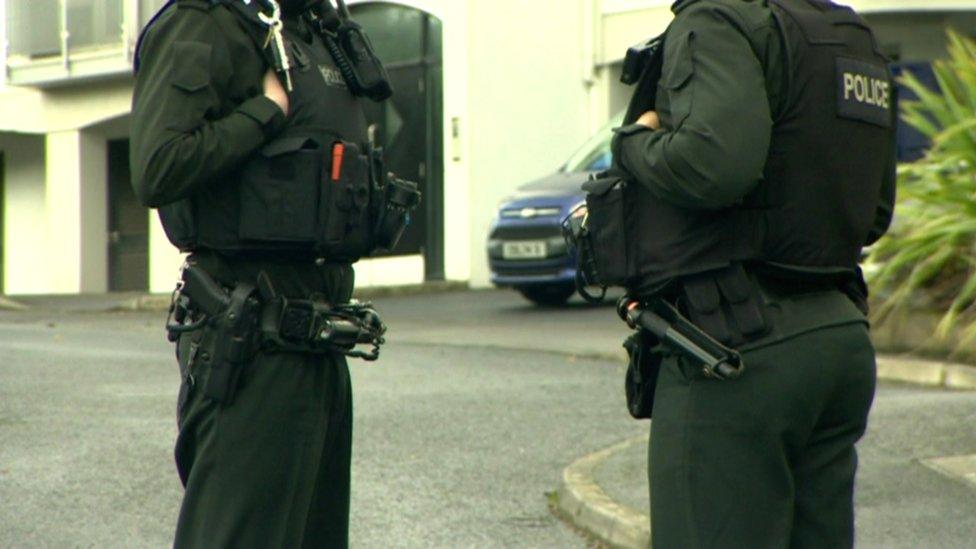'More NI officers should carry Tasers'
- Published

The report recommends the use of tasers to provide officers with more options with the minimum use of force
A new report has called for more police officers in Northern Ireland to be armed with taser devices on top of their regular service weapons.
It stated such a move could reduce the potential for shootings, with officers drawing their guns on an increasing number of occasions.
The report is from Her Majesty's Inspectorate of Constabulary.
It also found the PSNI had been "impressive" in its efforts to attract more Catholic recruits.
Currently taser devices, which fire an electric current designed to incapacitate individuals, are not issued to the vast majority of front-line personnel.
There are only about 300 Tasers available to specialist officers within a force of 7,000 people.
This was "not logical", meaning officers who respond "to serious incidents involving dangerous people have fewer options available to them to resolve the incident with the minimum use of force".
'Not without risk'
The report found in many instances officers instead drew their firearms which carried a "very high risk of inflicting fatal injury".
It added the use of Tasers was "not without risk" and that any move to issue them more widely would require consultation.
The report also found the "historically difficult relationship between the PSNI and some Catholic communities is improving".
Catholic officers make up about 30% of the force, which is not reflective of the composition of Northern Ireland society.
Earlier this year, for the first time, Sinn Féin politicians attended the launch of the new police recruitment campaign.

Senior Sinn Féin politicians Michelle O'Neill and Gerry Kelly attended a PSNI recruitment event in February
The inspection report also looked at the PSNI's use of stop and search powers.
It found they were not being monitored closely enough which meant the PSNI "can't be confident its officers are always behaving fairly and properly".
Inspector of Constabulary Matt Parr said: "The PSNI is generally effective at keeping people safe and reducing crime.
"It also largely offers a service that is good value for money."
'Serious mistake'
Deputy Chief Constable Mark Hamilton welcomed what he described as a "very positive report" and said the PSNI was "pleased inspectors acknowledged our continuing work in reaching out to communities".
On the use of Tasers, DCC Hamilton said the recommendation was noted and their availability was "one that we do not take for granted".
"Their issue and use is subject to rigorous accountability and limited to a small group of specialist officers trained and accredited to national standards," he added.
In response to the report's finding on stop and search powers, the deputy chief constable says a number of governance groups oversee the use of such police powers "to ensure they are being used proportionately and effectively".
Amnesty said a roll-out of Tasers in Northern Ireland would be a "serious mistake".
Patrick Corrigan, from the human rights organisation, said: "Since these electro-shock devices were issued to the PSNI in 2008, their use has increased to the point where Tasers were drawn or fired on almost 750 occasions in the last two years.
"Tasers are potentially lethal weapons, linked to hundreds of deaths in the USA and a growing number across the UK where they have been made increasingly available to police.
"More Tasers would inevitably mean more mistakes, more misuse, more tragedy and consequent damage to community relations."
Coronavirus impact
It has emerged that more than 300 police employees are currently self-isolating after potentially being exposed to Covid-19.
This includes 288 police officers - just under 5% of the workforce - and 28 police staff.
As a precautionary measure, parts of Musgrave Police Station in Belfast were closed on Saturday for a deep clean.
Police told BBC News NI that from 16 March to Wednesday 9 September, 39 police officers and staff have tested positive for the virus.
Of these, 16 are currently absent.
Ch Supt Simon Walls said: "The health and wellbeing of our officers and staff is of paramount importance and, since the beginning of Covid-19, we have carefully followed the direction and guidance from the Department of Health.
"Our advice to officers and staff who experience symptoms of Covid-19 follows the stay at home guidance from the Public Health Agency.
"We have extensive and robust business continuity plans in place to ensure that we continue to deliver for our communities throughout the pandemic."
- Published4 February 2020

- Published26 February 2020

- Published4 September 2019
